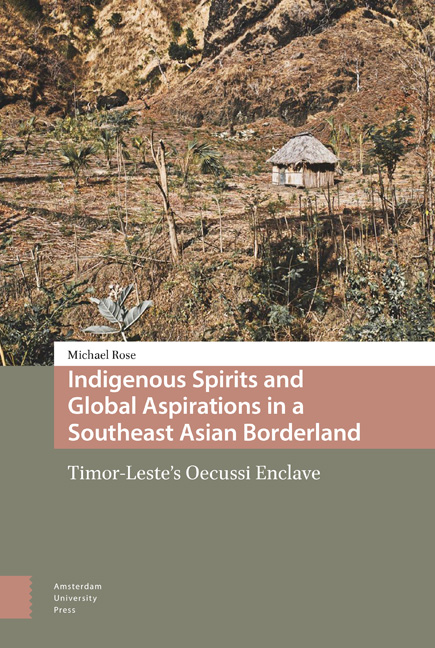 Indigenous Spirits and Global Aspirations in a Southeast Asian Borderland
Indigenous Spirits and Global Aspirations in a Southeast Asian Borderland Book contents
- Frontmatter
- Contents
- List of images
- Map
- A Note On Language
- Acknowledgements
- 1 Frontiers Imagined, Frontiers Observed
- 2 Body and Belief in Timor-Leste
- 3 The Ruin and Return of Markus Sulu
- 4 Angry Spirits in the Special Economic Zone
- 5 Stones, Saints and the ‘Sacred Family’
- 6 Meto Kingship and Environmental Governance
- 7 Ritual Speech and Education in Kutete
- Concluding Thoughts: Encounter, Change, Experience
- Selected Glossary
- Bibliography
- Index
- Miscellaneous Endmatter
6 - Meto Kingship and Environmental Governance
Published online by Cambridge University Press: 21 November 2020
- Frontmatter
- Contents
- List of images
- Map
- A Note On Language
- Acknowledgements
- 1 Frontiers Imagined, Frontiers Observed
- 2 Body and Belief in Timor-Leste
- 3 The Ruin and Return of Markus Sulu
- 4 Angry Spirits in the Special Economic Zone
- 5 Stones, Saints and the ‘Sacred Family’
- 6 Meto Kingship and Environmental Governance
- 7 Ritual Speech and Education in Kutete
- Concluding Thoughts: Encounter, Change, Experience
- Selected Glossary
- Bibliography
- Index
- Miscellaneous Endmatter
Summary
Abstract
This chapter revolves around the story of one of my neighbours in Oecusi, a Timorese public servant working in the government office charged with protecting the environment, and also the nephew (older brother's son) of the prince (naijuf) charged with the task of protecting the forest. Although presenting himself as a government employee, accompanying him into the forest it became clearer and clearer that perhaps even more important than the authority granted to him by the government was his position within the family of the prince. In this chapter I take Jose's story as a way of exploring how, while state policies have their origins in the kase world, their implementation is still vested in the meto.
Keywords: environment, hunting, syncretism, democracy
My original idea for this chapter, a case study exploring how Oecussi's pre-state political system both enables and complicates the authority of its present-day government, occurred to me during a long dry-season walk from Kutete to the coastal road. The enclave's large forests are nearly gone now, felled for fuel, or to make way for swidden gardens, but in the latter half of 2014, walking through a remnant stand of trees, I was excited to spot one of Oecussi's few surviving marsupials quickly vanishing up a hau kiu (tamarind tree).
‘Meda!’ (possum) I said to my travelling companion.
‘Sisi’ (meat) he replied, and promptly started climbing after it.
Whereas I saw a possum, and thought of the threatened eco-system of dry-land forests in the Lesser Sunda Islands, the result of having grown up in a place where ‘the environment’ was something to be studied, preserved, and maybe visited on school holidays, my friend was understandably more interested in it as a potential source of protein. On the road at the bottom of the hill, the local environmental office had placed a billboard announcing we were in a wildlife preserve, and asking people to protect wild animals for the generations for come (T: protega ita nia animal fuik ba gerasaun ikus mai), but we were coming down from a village where the ‘foi nsae (youngsters, literally those just come up) were stunted from a lack of healthy food in general and protein in particular, and it was clear to see why the message hadn't caught on.
- Type
- Chapter
- Information
- Indigenous Spirits and Global Aspirations in a Southeast Asian BorderlandTimor-Leste's Oecussi Enclave, pp. 167 - 190Publisher: Amsterdam University PressPrint publication year: 2020
